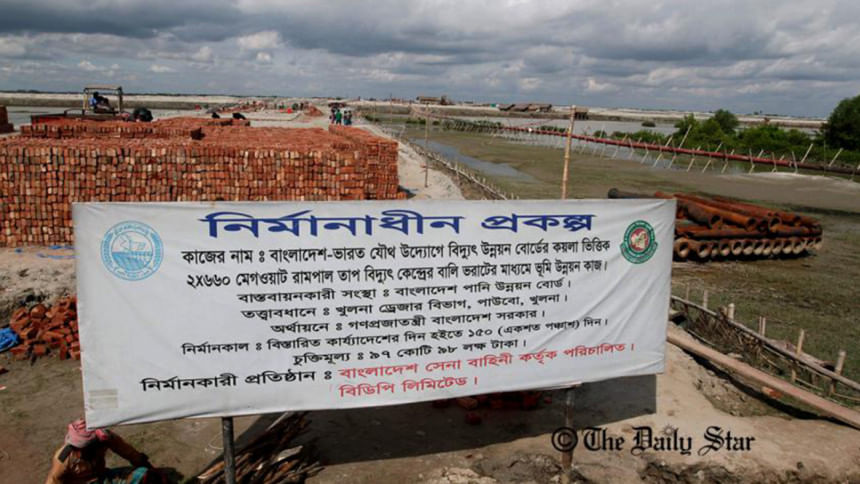Worries over Rampal plant

The South Asians for Human Rights, a regional network of rights activists, yesterday urged the government to suspend construction and other activities of Rampal plant near the Sundarbans until a comprehensive Environmental Impact Assessment (EIA) is conducted by independent and impartial experts.
It said the government should relocate the coal-fired power plant to an environmentally sustainable site if its effects on the Sundarbans are found damaging.
SAHR, a regional body of rights activists from Bangladesh, India, Pakistan, Nepal, Maldives and Afghanistan, came up with its views on the project at the launching of “Report of the fact-finding mission to Rampal, Bangladesh”.
Prof Abdullah Harun Chowdhury of Khulna University and green activist Sharif Jamil from Bangladesh and Sagar Dhar and Nityanand Jayaraman from India was on the fact-finding mission from April 5 to 11, visiting the project site and adjacent areas and talking to locals, affected villagers, government officials and policy makers.
The 43-page report detailed key human concerns and the flaws of the EIA approved by the Department of Environment on August 2013 with 59 conditions attached.
The mission found that land acquisition for the project had started on August 2011, even two years before the EIA was approved.
While the government claimed 150 families would be displaced by the project, the team learnt that 3,500 land-owning families submitted a written application to the district commissioner of Bagerhat in November 2011 alleging that they would be affected by the acquisition.
Displaced land owners were given Tk 2.7 lakh per acre though the market price in nearby areas is between Tk 5 -7 lakh, said the report, which also mentioned that lives and livelihood of 400 landless families had been affected by the acquisition.
Speakers at the event, moderated by rights activist and SAHR bureau member Khushi Kabir, noted that the Rampal project lacked transparency.
Abdul Matin, general secretary of Bangladesh Paribesh Andolon (Bapa) said that the government had suppressed facts regarding the project's distance from the Sundarbans.
The EIA report prepared by the government-owned Centre for Environmental and Geographic Information Services (CEGIS) stated that the distance of the project site from the Sundarbans is 14km.
In reality, considering the 10km buffer zone of the forest, the distance is only 4km, Matin said.
Referring to the EIA report's silence on pollution, rights activist and SAHR bureau member Sultana Kamal said the policy makers had not at all taken into consideration air and water pollution and destruction of forest resources while such impacts would deprive people of their livelihood.
The EIA report admitted that the project would expose people of surrounding areas to pneumonia but did not mention any mitigating measures, she noted.
The rights organisation criticised the EIA for its negligence in detailing air, surface and underwater pollution that would be caused by the coal ash and other gaseous substances released into the atmosphere during production.
It also mentioned how at least five external vessels would use water routes through the mangrove forest carrying coal and make about 400-500 trips a year, destroying habitat and posing threats of ecological disaster in case of spillage.
Besides, withdrawal of water from the river Passur would affect the river's navigability, salinity, and plant and animal life.
Even though the EIA made mention of discharge of gaseous pollutants, but there is no treatment plant in the project design, the organisation added.
Iftekharuzzaman, executive director of Transparency International Bangladesh, said that through a project like Rampal, Bangladesh is turning into a country responsible for climate change from a victim of climate change.
Referring to Prime Minister Sheikh Hasina's winning the UN “Champions of the Earth” award, Prof Anu Muhammad said, “The award would become a burden for her if this project goes on, destroying the Sundarbans."
Educationalist, writer and activist Abdullah Abu Sayeed urged the government to listen to the proper concerns of people.
Deekshya Illangasinghe, executive director of SAHR, also spoke at the event, held at the Jatiya Press Club.
Attended by rights activists, jurists, academics, public figures, trade unionists and media persons of South Asia, a convention held in India on July 21-22, 2000 decided to set up SAHR to promote democracy and uphold democracy in the region.
Pakistan Supreme Court lawyer Hina Jilani is the SAHR chairperson while Sri Lanka's attorney-at-law Nimalka Fernando the co-chair.

 For all latest news, follow The Daily Star's Google News channel.
For all latest news, follow The Daily Star's Google News channel. 



Comments